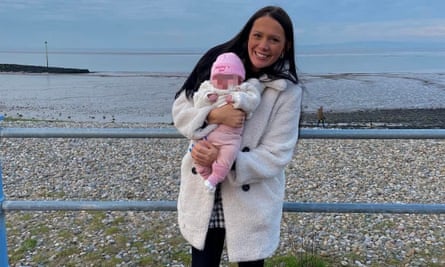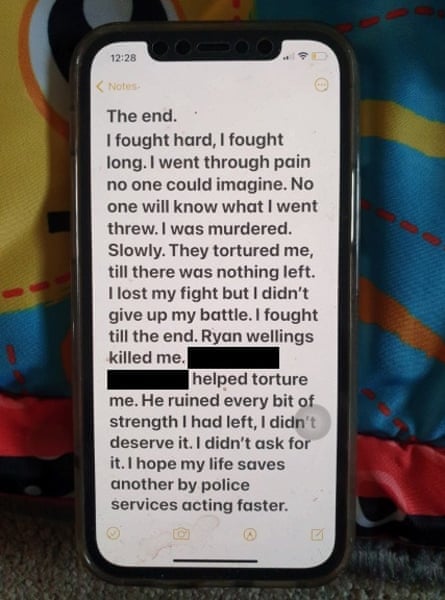Kiena Dawes’ final note was as heartbreaking as it was chilling. She talked of being strong and having dreams, of fighting hard, but losing after going through pain no one could imagine. She took her own life but squarely blamed one man for her death: “Ryan Wellings killed me,” she wrote.
It was a message from beyond the grave, which on Monday led to Wellings being convicted for assault and prolonged domestic abuse, but cleared of manslaughter.
The seven-week trial at Preston crown court has shone a light on what is a grim reality of domestic abuse for as many as one in four women in the UK. It also raises questions for Lancashire police as to whether more could have been done to protect Dawes from Wellings’ cruelty.
Three Lancashire police officers are facing disciplinary proceedings after an investigation by the watchdog, the Independent Office for Police Conduct.
Dawes was a 23-year-old hairdresser from Fleetwood, Lancashire, with her whole life before her. She was described during the trial as “bright and popular”, “almost universally loved”, and someone who went from being “a happy-go-lucky girl to frightened all the time”.
The reason she became frightened was Wellings, a 30-year-old landscape gardener from the Fylde Coast village of Bipsham.

The court heard Dawes was “swept off her feet” in what she thought was a “fairytale” romance. It was everything she had wanted and it seemed to be mutual, with Wellings having “Kiena” tattooed on his already heavily covered neck within days of meeting her, in January 2020, followed by a portrait of her face on his leg.
In hindsight, one witness described Wellings’ actions as “weird”. It was, perhaps, an early glimpse of the controlling monster he was.
The jury heard repeated evidence of the violence he meted out on Dawes: how he tried to strangle her with an iPhone charger cable; how he screamed at her that she was a “slag”, threw a stool at her and told her to kill herself; how he got a drill and “put it in my face and told me he would drill my teeth out of my mouth”; how he threatened to make Dawes look like the TV presenter and acid attack survivor Katie Piper.

A repeated pattern in the toxic relationship was Dawes leaving Wellings, only to go back to him.
The court heard that in July 2021 Wellings gave Dawes, by then six months pregnant, a black eye. She rang police but before they arrived he convinced her the baby would be taken off her – and she told the officers it was just a verbal argument.
Jurors were given a warning before being shown images of Dawes after a final attack by Wellings 11 days before her death. They showed a woman ground down, her head and face covered with blood, at 10.30am.
Giving evidence, PC Stephanie Sawyer described the scene: “There was blood on the floor in the communal corridor. Kiena was sat on the floor with the door open with her daughter between her legs. She was covered in blood, on her hands, on her face. She was upset and she was crying. She had a cut to the right side of her head. There was a broken towel rail in the bathroom.”
The officer dressed Dawes’ eight-month-old daughter, who was taken to her grandmother’s, and Dawes was taken to hospital in Blackpool for treatment.
Dawes said in a police statement that Wellings had called her a “schizophrenic freak” during a row, had “launched” her into a bathroom radiator, causing it to break from the wall, and had slammed the door towards her, hitting her head, causing her to black out and cutting her head.
Throughout the trial, Wellings denied being the villain. He insisted that images of Dawes’ injuries were the result of him restraining her as she attacked him, not of him beating her. “When she’s hitting me I used to stop her by grabbing her arms,” he told jurors.

His defence lawyer, John Jones KC, said Dawes was a “very troubled young lady” with a history of mental health problems and suicide attempts. He said whatever the difficulties in her relationship with Wellings, they were not the reason why she had chosen to kill herself, a decision made because of “multiple factors”.
Wellings point-blank denied the charges, trying to shift the blame to Dawes’ family. In the witness box, he wiped away tears, telling jurors: “I’m not a monster. Never have been.”
He was asked about a video he made within an hour of being charged with Dawes’ manslaughter. It featured loud music and showed him wearing sunglasses and holding a bottle while being driven in a car.
“I’m driving around with a bottle of prosecco,” he says in the video. “I have been told off an hour ago on a manslaughter charge. It’s all fucking shit.”
The prosecutor, Paul Greaney KC, accused Wellings of uploading it to intimidate the Dawes family. “What we see there is the real Ryan Wellings,” Greaney said. “Ryan Wellings the bully. The entitled person. The person who thinks he can do what he wants to people and say what he wants.”
Wellings replied: “I did not know what I was doing. I know I did wrong and did some stupid things. That’s me hurting. Being blamed for killing my kid’s mum, the woman I loved.”

The jury did not believe him. They believed witnesses such as Dawes’ best friend, Kacie Valentine, who said Dawes told her that when Wellings attacked her, he would say: “Hitting you is like hitting a man.”
They believed Dawes’ mother, Angela, who described an incident where Wellings dragged her daughter by the hair to the floor like a rag doll.
They believed Nicola Atherton, one of her old teachers, who said: “She just said the first six months were a fairytale but then it turned into a nightmare. Those were her exact words. Horrendous domestic violence. Horrendous physical abuse.”
The prosecution did not deny that Dawes had a history of mental health problems. She had an illness called emotionally unstable personality disorder, which can result in increased impulsivity, difficulty in relationships and poor self-esteem.
The court heard that Wellings knew she was vulnerable. Greaney said: “The defendant thoroughly and dreadfully exploited that vulnerability.”
On Dawses’ last day alive she drove to a friend’s house to find her friend was in the shower. She took her baby daughter into the house, still in her car seat, placed her down and returned to her vehicle, driving to a country lane near the West Coast main line where she took her own life.
The note she left on her phone read: “The end. I fought hard, I fought long. I went through pain no one could imagine.
“I hope my life saves another by police services acting faster. Don’t let bullies live free. Make sure the person who is tortured is heard. Let them have a voice. I lost my voice to them.”
-
In the UK and Ireland, Samaritans can be contacted on freephone 116 123, or email [email protected] or [email protected]. In the US, you can call or text the National Suicide Prevention Lifeline on 988, chat on 988lifeline.org, or text HOME to 741741 to connect with a crisis counselor. In Australia, the crisis support service Lifeline is 13 11 14. Other international helplines can be found at befrienders.org

.png) 3 months ago
43
3 months ago
43













































